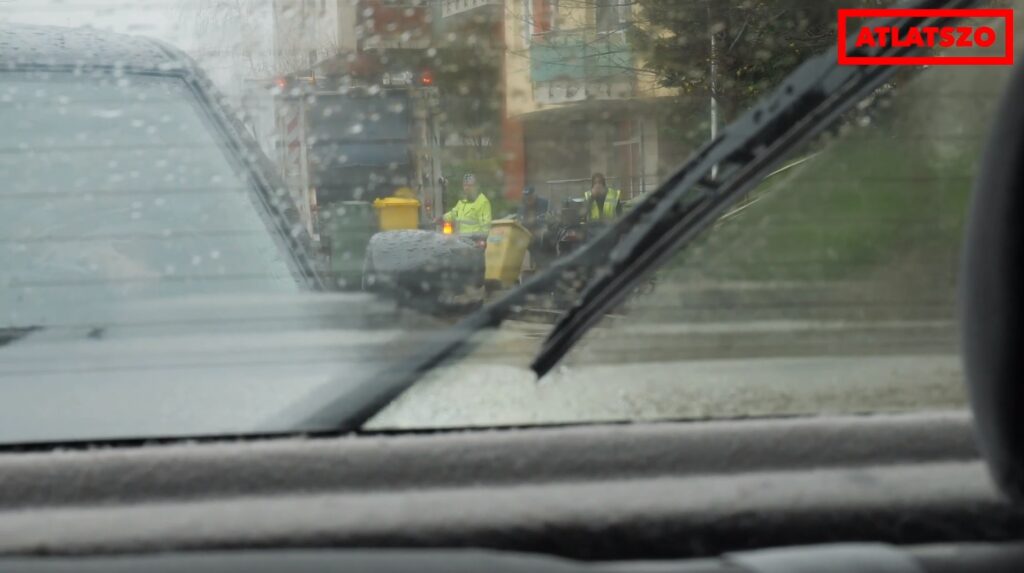The https://english.atlatszo.hu use cookies to track and profile customers such as action tags and pixel tracking on our website to assist our marketing. On our website we use technical, analytical, marketing and preference cookies. These are necessary for our site to work properly and to give us inforamation about how our site is used. See Cookies Policy
Irregular waste management in a residential area of Budapest documented on video
Household waste has been illegally collected and transported from a residential area in Budapest for more than a decade, Átlátszó revealed with the help of residents. This way the public utilities may have lost hundreds of thousands of euros, and the residents have not necessarily benefitted from this practice, either. We have not received any proper explanation for the irregular waste management, neither from the ‘alternative’ waste company, the representative of the condominiums or the Budapest Public Utilities. Átlátszó video-recorded the illegal garbage collection.
According to the law, only the public service provider of the Budapest Municipality (led by the opposition parties), the Budapest Public Utilities is entitled to manage the residential waste in the capital. However, this has not been the case in a 1,300-unit housing estate. This was brought to the attention of Átlátszó by a reader living in one of the condominiums. According to our reader, the residents were not properly informed by the condominiums’ representative, thus for a long time they were not aware that contracting another company (Fido Ltd.) was not legal.

On 27 March, we watched the waste collection and recorded it on video. One after the other, the garbage bins were emptied into Fido’s garbage truck – mixing the recyclable waste collected separately by the residents with the residual waste.
We sent a freedom of information data request to the Budapest Public Utilities (BKM), which revealed that BKM has indeed not had a service contract with any of the condominiums at Kondorosi street 8/A, 8/B, 10/A and 10/B since their construction. Only the oldest building in the estate, 12/A (263 flats, built in 2005) has got a contract with the public utility company, however, only for two mixed and four recyclable waste bins. Besides, BKM claimed that it has no contractual relationship with Fido Ltd.
According to the rules, if a house does not request and initiate contract for the public service, the service provider (BKM) should assume that each apartment in the house empties at least one 110-litre container a week, and has to bill accordingly until the contract is signed.
However, public service bills have never been issued to the houses in question, which led to a significant loss of income for the Budapest Public Utilities.
In response to our inquiry, Budapest Public Utilities said that it had sent a letter to the condominiums and to the representative and asked them to provide information how the condominiums comply with the public service obligation and how they pay the service fees. Budapest Public Utilities has also reported suspected illegal waste management activities to the responsible Pest County Government Office. BKM has requested the Government Office to carry out an investigation into the waste management activities of FIDO Ltd.
The Budapest Public Utilities, however, does not seem to feel competent to investigate the matter beyond the notification to the government office; as it wrote, “it is not our task and we are not in a position to investigate and sanction the extent and frequency with which a given property user uses the public waste management service.” Furthermore, the BKM “is not entitled to investigate, impose fines or enforce contractual relations against waste management operators”.
Besides the utilities, we have also contacted the representative of the condominiums (SZ&S Group) but unfortunately have not received any substantive information from them. As they wrote, “according to the legislation and data management rules, we are not allowed to provide information on the condominium’s contractual relations to third parties without the prior permission of the condominium. We will take steps to obtain the authorisation of the general assembly to provide the information you have requested. We kindly ask for your patience until such authorisation is obtained.” However, this had not been done by the time of publication of this article.
Regarding SZ&S Group, which humbly calls itself as the “property manager of Budapest”, our reader said that there have been complaints in the past and even legal proceedings. Several decisions of the general assembly have been declared invalid by the court, and a notarial process has been initiated as well. The posts on the housing estate’s blog were also written almost exclusively in a negative context in relation to the representation.
According to the reports of the condominiums we have seen, Fido Ltd. collects rubbish for 4-5 million HUF per house per year. If the figures on the invoices are believable, the unit price is higher than BKM would charge for the normal public service.
Although the difference may not seem much, on an annual basis this can mean an extra cost of up to two-three thousand euros per house, which questions the sensibility of the whole practice. At least from the tenants’ point of view.
According to our reader, the residents “are now beginning to realise that they have been misled by the representative. It will certainly be held to account for this at the forthcoming annual general meetings. It might also do good to investigate how the BKM has not noticed that they do not go to one condominium but to the next, or that they quite unfeasibly only produce a few bins of rubbish in a condominium of hundreds of flats.”
In this context, the BKM said that there is no single register with an adequate legal basis, and that they therefore have very limited means of detecting which property users are not using the public service.
The question is: how many similar houses might still be out there in Budapest?
Written and translated by Orsolya Fülöp. Video by Bence Bodoky. The more detailed Hungarian version of this story is available here.

